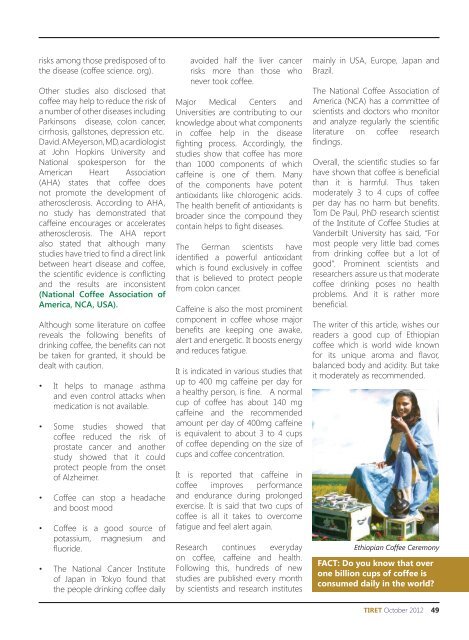TIRET October 2012 Issue - MIDROC Ethiopia
TIRET October 2012 Issue - MIDROC Ethiopia
TIRET October 2012 Issue - MIDROC Ethiopia
Create successful ePaper yourself
Turn your PDF publications into a flip-book with our unique Google optimized e-Paper software.
isks among those predisposed of to<br />
the disease (coffee science. org).<br />
Other studies also disclosed that<br />
coffee may help to reduce the risk of<br />
a number of other diseases including<br />
Parkinsons disease, colon cancer,<br />
cirrhosis, gallstones, depression etc.<br />
David. A Meyerson, MD, a cardiologist<br />
at John Hopkins University and<br />
National spokesperson for the<br />
American Heart Association<br />
(AHA) states that coffee does<br />
not promote the development of<br />
atherosclerosis. According to AHA,<br />
no study has demonstrated that<br />
caffeine encourages or accelerates<br />
atherosclerosis. The AHA report<br />
also stated that although many<br />
studies have tried to find a direct link<br />
between heart disease and coffee,<br />
the scientific evidence is conflicting<br />
and the results are inconsistent<br />
(National Coffee Association of<br />
America, NCA, USA).<br />
Although some literature on coffee<br />
reveals the following benefits of<br />
drinking coffee, the benefits can not<br />
be taken for granted, it should be<br />
dealt with caution.<br />
• It helps to manage asthma<br />
and even control attacks when<br />
medication is not available.<br />
• Some studies showed that<br />
coffee reduced the risk of<br />
prostate cancer and another<br />
study showed that it could<br />
protect people from the onset<br />
of Alzheimer.<br />
• Coffee can stop a headache<br />
and boost mood<br />
• Coffee is a good source of<br />
potassium, magnesium and<br />
fluoride.<br />
• The National Cancer Institute<br />
of Japan in Tokyo found that<br />
the people drinking coffee daily<br />
avoided half the liver cancer<br />
risks more than those who<br />
never took coffee.<br />
Major Medical Centers and<br />
Universities are contributing to our<br />
knowledge about what components<br />
in coffee help in the disease<br />
fighting process. Accordingly, the<br />
studies show that coffee has more<br />
than 1000 components of which<br />
caffeine is one of them. Many<br />
of the components have potent<br />
antioxidants like chlorogenic acids.<br />
The health benefit of antioxidants is<br />
broader since the compound they<br />
contain helps to fight diseases.<br />
The German scientists have<br />
identified a powerful antioxidant<br />
which is found exclusively in coffee<br />
that is believed to protect people<br />
from colon cancer.<br />
Caffeine is also the most prominent<br />
component in coffee whose major<br />
benefits are keeping one awake,<br />
alert and energetic. It boosts energy<br />
and reduces fatigue.<br />
It is indicated in various studies that<br />
up to 400 mg caffeine per day for<br />
a healthy person, is fine. A normal<br />
cup of coffee has about 140 mg<br />
caffeine and the recommended<br />
amount per day of 400mg caffeine<br />
is equivalent to about 3 to 4 cups<br />
of coffee depending on the size of<br />
cups and coffee concentration.<br />
It is reported that caffeine in<br />
coffee improves performance<br />
and endurance during prolonged<br />
exercise. It is said that two cups of<br />
coffee is all it takes to overcome<br />
fatigue and feel alert again.<br />
Research continues everyday<br />
on coffee, caffeine and health.<br />
Following this, hundreds of new<br />
studies are published every month<br />
by scientists and research institutes<br />
mainly in USA, Europe, Japan and<br />
Brazil.<br />
The National Coffee Association of<br />
America (NCA) has a committee of<br />
scientists and doctors who monitor<br />
and analyze regularly the scientific<br />
literature on coffee research<br />
findings.<br />
Overall, the scientific studies so far<br />
have shown that coffee is beneficial<br />
than it is harmful. Thus taken<br />
moderately 3 to 4 cups of coffee<br />
per day has no harm but benefits.<br />
Tom De Paul, PhD research scientist<br />
of the Institute of Coffee Studies at<br />
Vanderbilt University has said, “For<br />
most people very little bad comes<br />
from drinking coffee but a lot of<br />
good”. Prominent scientists and<br />
researchers assure us that moderate<br />
coffee drinking poses no health<br />
problems. And it is rather more<br />
beneficial.<br />
The writer of this article, wishes our<br />
readers a good cup of <strong>Ethiopia</strong>n<br />
coffee which is world wide known<br />
for its unique aroma and flavor,<br />
balanced body and acidity. But take<br />
it moderately as recommended.<br />
<strong>Ethiopia</strong>n Coffee Ceremony<br />
FACT: Do you know that over<br />
one billion cups of coffee is<br />
consumed daily in the world?<br />
TireT <strong>October</strong> <strong>2012</strong> 49



